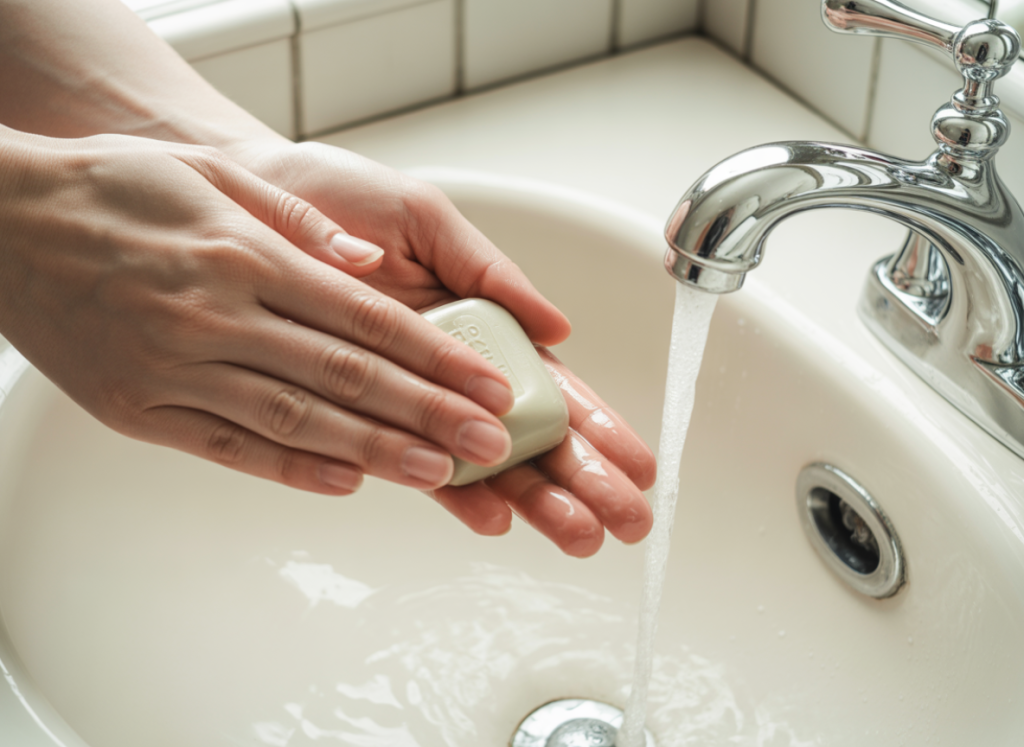If you’ve ever wondered why my eczema is getting worse, you’re not alone.
Eczema often flares up without warning, leaving skin sore and frustratingly unpredictable. Everyday things that make eczema worse, like soaps, stress, or even changes in weather, can sneak into your routine without notice.
The good news? Once you spot these patterns, it becomes easier to manage flare-ups and keep your skin feeling a little calmer day to day.
Harsh Soaps and Detergents
Some of the most common eczema triggers hide in everyday cleaning products. Harsh soaps and detergents can strip away your skin’s natural oils, leaving it dry, itchy, and more prone to flare-ups. Even products that smell pleasant can contain ingredients that irritate sensitive skin.
Switching to fragrance-free or sensitive-skin formulas can really help. Try using mild cleansers, wearing gloves when cleaning, and double-rinsing clothes. These small swaps can make a noticeable difference, helping reduce skin irritation and eczema and keeping your skin barrier a little happier.

Changes in Weather and Temperature
Weather and eczema often go hand in hand. Cold, dry air in winter can pull moisture from your skin, while hot, humid days can lead to sweat and irritation. Even quick temperature shifts, like moving from a warm room into the cold, can unsettle your skin barrier.
To stay balanced, try layering clothing, using a humidifier indoors, and applying moisturiser after being outside. Small, consistent adjustments like these can make changing seasons much easier on sensitive skin.
High Levels of Stress
Eczema and stress often go together. When life feels hectic, your body releases hormones that can inflame the skin and trigger fresh flare-ups. It’s not just in your head; emotional tension really can make eczema harder to manage.
Simple habits like gentle stretching, short walks, or breathing exercises can ease pressure throughout the day. Even a few quiet minutes can help calm both mind and skin. Reducing stress won’t cure eczema, but it can make breakouts less frequent and easier to handle.
Certain Foods and Allergens
For some people, food plays a subtle part in flare-ups. Dairy, eggs, nuts, or gluten can act as eczema diet triggers, though everyone’s different. Rather than cutting foods out quickly, keep a food diary to spot patterns between meals and symptoms.
This small step helps you see connections without unnecessary restriction. If you think food might be a trigger, speak with a GP or dietitian for tailored guidance. Understanding how diet affects your skin can make managing eczema far less confusing.

Pollen and Environmental Irritants
When pollen counts rise, so can skin irritation for some people living with eczema. Dust, mould, and even air pollution can also act as common eczema triggers, especially if your skin’s already feeling sensitive. These small particles can cling to clothes and hair, making itching or redness worse as the day goes on.
Try changing clothes after spending time outdoors and gently cleansing exposed skin when you get home. Keeping windows closed on high-pollen days and using an air purifier indoors may also help reduce flare-ups. While you can’t control the air around you completely, minimising contact often makes a noticeable difference.
Sweating and Heat
Sweating is one of those everyday things that makes eczema worse. When sweat dries, salt can sting and irritate already sensitive skin, while heat makes flare-ups itchier and more uncomfortable.
Wearing loose, breathable fabrics helps your skin stay cool. Take short breaks during exercise, gently pat away sweat instead of rubbing, and moisturise after washing. These small habits help reduce irritation and keep skin calmer, even on hot or active days.
Wool and Synthetic Fabrics
Some clothing materials can be surprisingly harsh on sensitive skin. Wool, for instance, may feel warm and soft at first, but the fibres can quickly lead to itching or irritation. Similarly, certain synthetic fabrics that cause eczema symptoms tend to trap heat and moisture, which makes things worse.
To help your skin breathe, go for soft cotton or bamboo fabrics instead; they’re smoother and less likely to rub. It’s also worth cutting out any scratchy labels or seams that might aggravate problem areas. Comfortable, breathable clothing really can make a noticeable difference to daily skin comfort.
Dust Mites in the Home
Dust mites are tiny, invisible creatures that love warm, humid environments, like bedding, carpets, and upholstery. For some people, these are surprisingly common eczema triggers, as mite droppings can irritate already sensitive skin. It’s one of those background issues that’s easy to overlook yet often adds to day-to-day flare-ups.
Try washing bedding weekly at 60°C, using allergen-proof mattress covers, and vacuuming carpets regularly with a HEPA filter. If possible, keep rooms well-ventilated and clutter-free. Small changes like these can noticeably cut down skin irritation, eczema and help your skin feel calmer at home.
Pet Dander
For animal lovers, this one can be tough. Pet dander, tiny flakes of skin and hair shed by cats, dogs, and other animals, is another of those common eczema triggers that can make flare-ups worse. These particles can cling to furniture, carpets, and even your clothes, irritating you long after cuddles are over.
You don’t necessarily have to part with your pet, though. Regular grooming, using an air purifier, and keeping pets out of the bedroom can help reduce build-up. Washing your hands after handling animals also helps lower the chance of skin irritation and eczema developing from daily contact.
Long, Hot Showers
A long, steamy shower might feel relaxing, but it’s one of the everyday things that make eczema worse without many people realising it. Hot water strips away the skin’s natural oils, leaving it dry, tight, and more prone to irritation later on. It’s a classic case of something soothing in the moment but aggravating over time.
Try shorter, lukewarm showers instead, and pat your skin dry gently with a soft towel rather than rubbing. Applying moisturiser straight afterwards helps lock in hydration and supports the skin barrier, a small change that can noticeably ease flare-ups.
Eczema often feels unpredictable, but it usually follows patterns. If you’ve been asking why my eczema is getting worse, it might be your skin’s way of reacting to daily triggers, like stress, heat, or certain fabrics. Tracking when flare-ups appear can reveal what’s really setting things off.
Over time, those insights help you manage symptoms more confidently. If irritation keeps returning or feels severe, it’s best to speak with one of our pharmacists for individual advice and treatment options. Learn more about eczema treatments, or contact us for further support and guidance.


